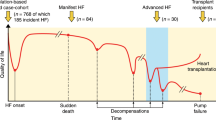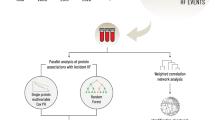Abstract
Unraveling the molecular complexities of human heart failure, particularly end-stage failure, can be achieved by combining multiple investigative approaches. There are several parts to the problem. Each patient is the product of a complex set of genetic variations, different degrees of influence of diets and lifestyles, and usually heart transplantation patients are treated with multiple drugs. The genomic status of the myocardium of any one transplant patient can be analysed using gene arrays (cDNA- or oligonucleotide-based) each with its own strengths and weaknesses. The proteins expressed by these failing hearts (myocardial proteomics) were first investigated over a decade ago using two-dimensional polyacrylamide gel electrophoresis (2DGE) which promised to resolve several thousand proteins in a single sample of failing heart. However, while 2DGE is very successful for the abundant and moderately expressed proteins, it struggles to identify proteins expressed at low levels. Highly focused first dimension separations combined with recent advances in mass spectrometry now provide new hope for solving this difficulty. Protein arrays are a more recent form of proteomics that hold great promise but, like the above methods, they have their own drawbacks. Our approach to solving the problems inherent in the genomics and proteomics of heart failure is to provide experts in each analytical method with a sample from the same human failing heart. This requires a sufficiently large number of samples from a sufficiently large pool of heart transplant patients as well as a large pool of non-diseased, non-failing human hearts. We have collected more than 200 hearts from patients undergoing heart transplantations and a further 50 non-failing hearts. By combining our expertise we expect to reduce and possibly eliminate the inherent difficulties of each analytical approach. Finally, we recognise the need for bioinformatics to make sense of the large quantities of data that will flow from our laboratories. Thus, we plan to provide meaningful molecular descriptions of a number of different conditions that result in terminal heart failure.
Similar content being viewed by others
Author information
Authors and Affiliations
Rights and permissions
About this article
Cite this article
Dos Remedios, C., Liew, C., Allen, P. et al. Genomics, proteomics and bioinformatics of human heart failure. J Muscle Res Cell Motil 24, 251–261 (2003). https://doi.org/10.1023/A:1025433721505
Issue Date:
DOI: https://doi.org/10.1023/A:1025433721505




